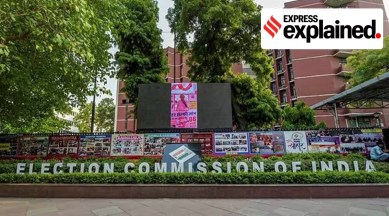Ritika Chopra, an award-winning journalist with over 17 years of experience, serves as the Chief of the National Bureau (Govt) and National Education Editor at The Indian Express in New Delhi. In her current role, she oversees the newspaper's coverage of government policies and education. Ritika closely tracks the Union Government, focusing on the politically sensitive Election Commission of India and the Education Ministry, and has authored investigative stories that have prompted government responses. Ritika joined The Indian Express in 2015. Previously, she was part of the political bureau at The Economic Times, India’s largest financial daily. Her journalism career began in Kolkata, her birthplace, with the Hindustan Times in 2006 as an intern, before moving to Delhi in 2007. Since then, she has been reporting from the capital on politics, education, social sectors, and the Election Commission of India. ... Read More
Delhi excise policy case: What are the options for Election Commission if AAP is named as an accused?
According to former officers of the poll panel, in terms of punitive action against a party, the options available to the Commission are rather limited. Here's how.

The Enforcement Directorate’s (ED) proposal in the Supreme Court to name the Aam Aadmi Party (AAP) as an accused in the Delhi excise policy case will place the Election Commission (EC) in uncharted territory as there’s no prescription in the electoral rules and laws on what should be done when a political party is accused of any illegality.
According to former officers of the poll panel, in terms of punitive action against a party, the options available to the Commission are rather limited. The EC is, at best, empowered to suspend or withdraw a party’s recognition under The Election Symbols (Reservation and Allotment) Order.
monthly limit of free stories.
with an Express account.
“However, even then, Para 16A of the Symbols Order clearly outlines the grounds on which the Commission can take such action against a party. It’s when the party fails to observe the Model Code of Conduct or doesn’t follow the orders and instructions of the Commission. There’s nothing on what should happen if the party is accused of illegality,” a former EC officer told The Indian Express on the condition of anonymity.
“Moreover, just being an accused doesn’t amount to anything. Even MPs and MLAs are disqualified only when they are convicted of an offence,” the former officer said.
The second punitive option before the Commission is to de-register a party. But this is an extremely limited option. While Section 29A of The Representation of the People Act, 1951, empowers the EC to register a party, it can review its decision only under three exceptions.
First, if the party has obtained its registration by fraud. Second, if the party informs the EC that it has ceased to have faith and allegiance to the Constitution of India or to the principles of socialism, secularism and democracy or it will not uphold the sovereignty, unity and integrity of India. Third, if the party is declared unlawful by the Union Government under the provision of the Unlawful Activities (Prevention) Act, 1967 or any other similar law.
“So if AAP were to be named or even convicted under the PMLA, The Representation of the People Act has no provision to deal with it,” said another former officer of the Commission.
But even before delving into the grounds on which the EC can or cannot act against the AAP in case it’s found guilty of any wrongdoing, a legal expert questioned whether AAP could be added as an accused under Section 70 of the PMLA, given that a political party is not a company.
Section 70 of PMLA deals with offences committed by companies. A party, according to Section 29A of The Representation of the People Act, is any association or body of individual citizens of India registered with the EC and calling itself a political party. It doesn’t fall within the definition of company. “So it’s unclear how AAP can be implicated under Section 70 of PMLA,” the expert said.